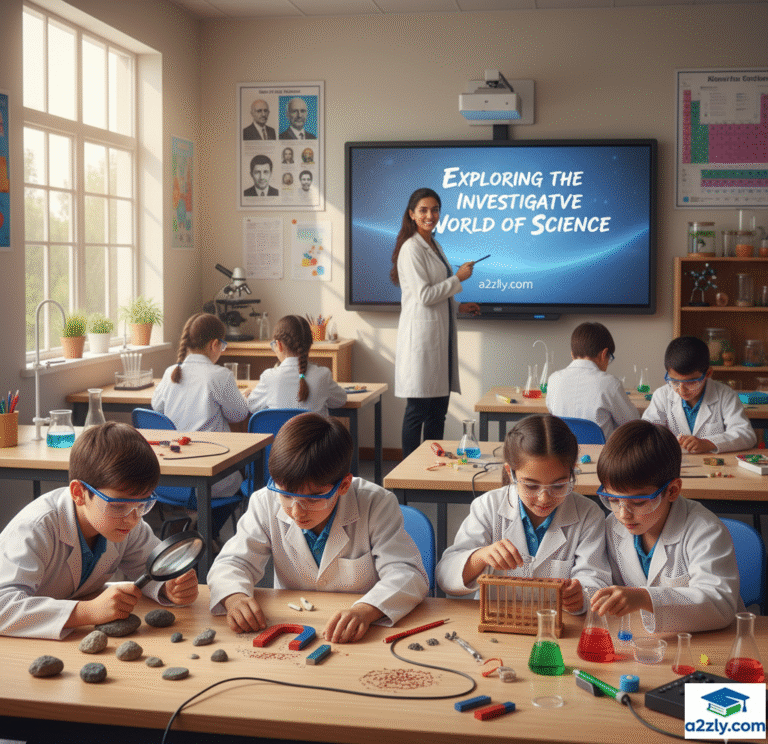🧭 Chapter Overview
Science begins with questions.
Why is the sky blue? How do plants grow? Why do objects fall to the ground?
From an early age, we observe, think, and wonder—that’s where science begins.
This chapter, “Exploring the Investigative World of Science,” takes us through the essence of scientific thinking—observation, curiosity, experimentation, and problem-solving.
By the end, you’ll realize that science is not just a subject—it’s a way of looking at the world.
Table of Contents
🔍 1.1 What Is Science?
Science is a systematic way of understanding the world around us through observation, experimentation, and logical reasoning.
It helps us find answers, make inventions, and improve lives—from mobile phones to medicines.
“Science is curiosity in action—observing, questioning, testing, and learning.”
🔬 Science is Everywhere!
- Boiling water = Chemistry + Physics
- Breathing = Biology
- Rainbows = Optics (Physics)
- Using a magnet = Electromagnetism
Science can explain everything you see, touch, or experience.
🧪 1.2 The Investigative Nature of Science
Science grows through investigation — asking “why” and “how” questions, forming hypotheses, and testing them through experiments.
Let’s see the steps scientists follow. 👇
| Step | Description | Example |
|---|---|---|
| Observation | Noticing something interesting | Ice melts faster in salt water |
| Question | Asking “why/how” | Why does salt make ice melt faster? |
| Hypothesis | Possible explanation | Salt lowers freezing point |
| Experimentation | Testing through controlled setup | Compare plain & salted ice |
| Analysis | Checking results | Salted ice melted first |
| Conclusion | Drawing meaning | Hypothesis proven! |
🧠 This is called the Scientific Method.
🧩 Activity: “Salt & Ice” Experiment
Try this at home:
- Take two bowls of ice cubes.
- Sprinkle salt in one and leave the other plain.
- Observe which melts first.
👉 You’ve just practiced scientific investigation!
🌱 1.3 Observation—The First Step in Science
Observation means using your senses (sight, hearing, touch, smell, and taste) to gather information.
Example:
- The sky turns orange in the evening (sight).
- Wet clothes dry faster in sunlight (touch & sight).
Observation helps us notice patterns and differences, forming the basis of discovery.
🌈 India’s Ancient Observation Science
Ancient Indian scientists used keen observation to study stars, seasons, and medicine.
- Aryabhata calculated the Earth’s rotation.
- Sushruta observed the human body and created surgical techniques.
- Varahamihira studied weather patterns and astronomy.
Their curiosity laid the foundation for modern science—centuries before telescopes or labs existed!
⚙️ 1.4 Hypothesis—The “Smart Guess”
A hypothesis is an educated guess that can be tested.
Example:
💭 “If plants receive sunlight, then they grow faster.”
We test this assertion by experimenting:
- Keep one plant in sunlight. 🌞
- Another in shade 🌑
- Observe growth difference
Results confirm or reject the hypothesis—and that’s how theories evolve.
🔬 1.5 Experimentation—The Heart of Science
Science becomes meaningful when ideas are tested.
An experiment is a planned activity to determine whether a hypothesis is true or false.
Parts of an Experiment:
- Variables—things you change (e.g., light exposure).
- Control—Standard to compare (e.g., same plant species).
- Observation —measured results (growth rate).
⚡ Example Experiment: Photosynthesis Test
Aim: To prove that sunlight is needed for photosynthesis.
Process:
- Cover one leaf of a plant with black paper.
- Keep it in sunlight for a day.
- Test both leaves with iodine.
Result:
Only the uncovered leaf turns blue-black (starch formed)—proving sunlight is essential.
🧠 India’s Scientific Approach
India’s “Jigyasa” (curiosity) has long encouraged questioning and exploration—from Panini’s grammar analysis to Jagadish Chandra Bose’s plant research.
Their method? Observe → Question → Experiment → Share.
💡 1.6 The Role of Creativity in Science
Science is not just logic—it’s creativity + curiosity.
Every invention began with imagination:
| Discovery | Scientist | Creative Spark |
|---|---|---|
| Gravity | Isaac Newton | Apple falling from a tree |
| X-rays | Wilhelm Roentgen | Glowing screen accident |
| Microwave Oven | Percy Spencer | Chocolate melting near radar |
| Radio Waves | Jagadish Chandra Bose | Experimental plant study |
🎨 Creativity helps scientists think differently—that’s why innovation is born from imagination!
⚖️ 1.7 Scientific Attitude
A scientific attitude means thinking rationally, questioning logically, and avoiding superstition.
| Trait | Meaning |
|---|---|
| Curiosity | Desire to learn and know more |
| Objectivity | No personal bias |
| Open-mindedness | Accepting new ideas |
| Patience | Accepting failure as part of learning |
| Honesty | Reporting true results |
Example:
Instead of believing “eclipses are bad,” we study how they happen—Earth’s shadow on the moon = lunar eclipse.
🧠 1.8 Applications of Scientific Investigation in Daily Life
Science isn’t limited to laboratories—it’s in your home, kitchen, and surroundings!
| Situation | Scientific Idea | Benefit |
|---|---|---|
| Boiling water | Heat transfer | Cooking made faster |
| Refrigerator | Evaporation & condensation | Keeps food fresh |
| Smartphone | Communication tech | Connects globally |
| Vaccination | Immunity | Prevents diseases |
| Composting | Decomposition | Reduces waste |
🧩 Mini Activity: “Science in My Home”
Observe your daily life. Identify 5 scientific principles in use (e.g., refraction in spectacles, magnetic door latches, etc.).
🌍 1.9 Science, Society, and Sustainability
Science has changed human life—but it must be used responsibly.
Good Uses:
✅ Medicine
✅ Clean energy
✅ Space exploration
Misuses:
❌ Pollution
❌ Overuse of plastics
❌ Deforestation
🧭 True progress is when science benefits both people and the planet.
🇮🇳 Our Scientific Heritage
India has a proud history of discoveries that shaped the world:
- Sushruta – Surgery (Sushruta Samhita)
- Aryabhata – Earth’s rotation and solar system
- Charaka—Ancient medicine and body systems
- Bhaskaracharya—Gravity before Newton!
- Jagadish Chandra Bose – Radio waves and plant response
Their spirit of curiosity, experimentation, and sharing continues in the NEP 2025 vision—to make students think like scientists, not memorize facts.
🧠 HOTS (Higher Order Thinking Skills)
- Why is observation the first step of the scientific method?
- How does creativity help in scientific discovery?
- Can you identify a situation where an experiment failed but led to a discovery?
- How does NEP 2025 promote scientific thinking?
- Why should we question superstitions through scientific inquiry?
💡 Memory Booster Box
🔹 Observation → Hypothesis → Experiment → Conclusion
🔹 Creativity drives discovery
🔹 Failures = learning opportunities
🔹 Scientific attitude = curiosity + honesty + logic
🔹 India’s legacy = curiosity + innovation
📘 Quick Recap
✅ Science = Observation + Logic + Experimentation
✅ Investigation → Discovery → Application
✅ India’s legacy = Early science and innovation
✅ Science must promote sustainability and truth
✅ NEP 2025 = Inquiry-based learning
🔗 INTERNAL & EXTERNAL LINKS
Internal Links (A2ZLY):
- Chapter 2 – When the Winds Blow Class 8 Notes 2025
- Class 8 Science All Chapters Smart Notes 2025
- NEP 2025 Science Hub | A2ZLY
External Links:

